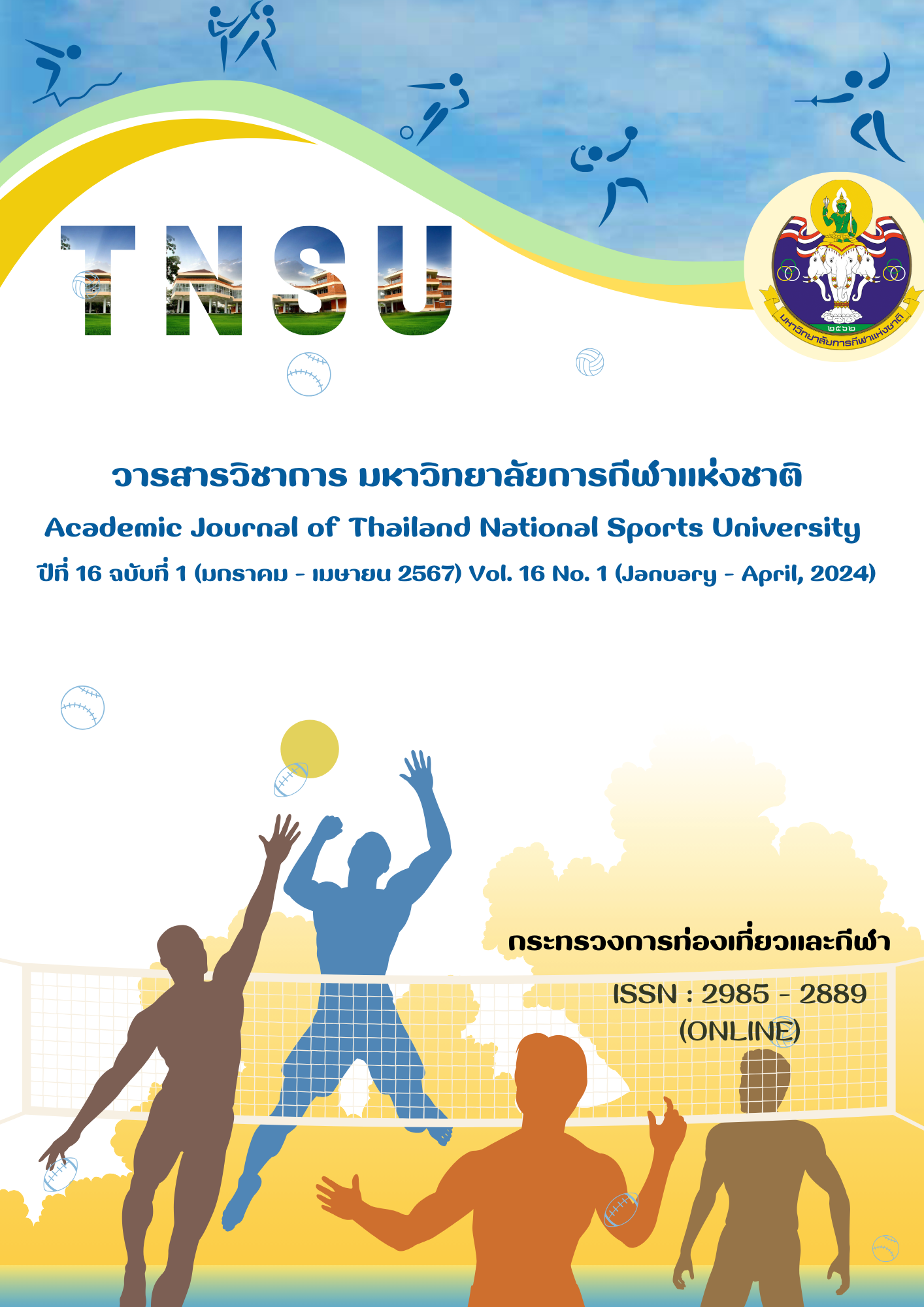EFFECTS OF HEALTH EDUCATION LEARNING ACTIVITIES USING SELF – DIRECTED LEARNING AND HIGHER ORDER QUESTIONING TECHNIQUES ON LEARNING ACHIEVEMENT AND SELF – MANAGEMENT COMPETENCY OF SECONDARY STUDENTS
Main Article Content
Abstract
Purposes: To compare mean scores of learning achievement and self - management competency before and after implementation of an experimental group and a control group, and to compare mean scores of learning achievement and self-management competency after implementation between the experimental group and the control group. Methods: The subjects were 50 eight grade students at Thung Chang School, who were selected by cluster and randomly divided equally into two groups: 25 of the experimental group were assigned to study under the health education learning activities using self - directed learning and higher order questioning techniques and 25 of the control group were assigned to study with the conventional teaching method. The research instruments were comprised of 8 health education lesson plans using self - directed learning and higher order questioning techniques and the data collection instruments included learning achievement in the area of knowledge, attitude, practice and self - management. Data were analyzed by mean, standard deviation and t - test (Paired Sample t - test, Independent Sample t - test). Results: The research finding was as follows: The mean scores of the learning achievement in the area of knowledge, attitude, practice and self - management competency of the experimental group students after learning were significantly higher than that before learning at .05 level, and the mean scores of the learning achievement and self-management competency of the experimental group students after learning were significantly higher than that of the control group students at .05 level. Conclusion: health education learning activities using self-directed learning and higher order questioning techniques had an effect on learning achievement and self-management competency of eight grade students higher than health education learning activities with conventional teaching method.
Article Details

This work is licensed under a Creative Commons Attribution-NonCommercial-NoDerivatives 4.0 International License.
The published article is a copyright of the Academic Journal of Thailand National Sports University. The passage appeared in each article in this academic journal is a perspective of each author which is not related to the journal. Each author is required to be responsible for all components of his/her own article. If there are any mistakes, each author must be responsible for those mistakes on his/her own.
References
Candy, P. C. (1991). Self - direction for lifelong learning: A comprehensive guide to theory and Practice. SanFrancisco: Jossey - Bass.
Cramm, J. M., Strating, M. M., De Vreede, P. L., Steverink, N., & Nieboer, A. P. (2012). Validation of the self - management ability scale (SMAS) and development and validation of a shorter scale (SMAS-S) among older patients shortly after hospitalisation. Health and quality of life outcomes 2012, 10(1).
Davoudi, M. & Sadeghi, N. A. (2015). A systematic review of research on questioning as a highlevel cognitive strategy. English Language Teaching, 8(10), 76 - 90.
Griffin, Colin. (1983). Curriculum theory in adult lifelong education. London: Croom Halm.
Giles, S. (2018). How VUCA Is reshaping the business environment, and what it means for innovation. Retrieved from https://www.forbes.com
Hill, J. B. (2012). Questioning technique: A Study of Instructional Practice (Doctoral dissertation), University of Pennsylvania.
Jarunee Youngsuk. (2009). A study of the invariance of the self - management ability model of the third level students (Master’s thesis), Srinakharinwirot University.
Khan, W. B. (2011). A study of lower - order and higher - order questions at secondary level. IER university of Peshawar, Pakistan. Asian Social Science, 7(9), 149 – 157.
Knowles, M. S. (1975). Self - directed learning: A guide for learners and teachers. New York: Association Press. Retrieved from https://journals.sagepub.com/doi/10.1177/105960 117700200220
Kornphatcha Klaypikun. (2017). The effect of the individual and family self - management program on bowel preparation behavior for colonoscopy in older persons. HCU Journal, 21(42), 123 - 137.
McNeil, L. (2010). Beyond the products of higher - order questioning: How do teacher and English - language learner perceptions influence practice? TESOL Journal, 2, 74 - 90.
Ngampun Sayyasri, Wipawan Wongsuwan Kongpow, & Soison Sakolrak. (2018). Development of an instructional model using the engagement - based learning and teaching and self - directed learning for enhancing reading habit of seventh grade students. Srinakharinwirot Research and Development (Journal of Humanities and Social Sciences), 12(23), 1 - 12.
Nichakan Saridpaisan, Pattaraporn Chaiprasert, & Parinya Thongsorn. (2019). The effects of learning management using scientific methods with higher - order questions to promote learning achievement, integrated science process skills, and analytical thinking ability of 7 grade students. Journal of Education Naresuan University, 21(3), 113 - 126.
Office of the Basic Education Commission. (2021). Self - management competency. Retrieved from https://shorturl.asia/RzgD4
Office of the Permanent Secretary, Ministry of Education. (2018). Self - knowledge skills. Retrieved from https://shorturl.asia/ZBR4y
Shotiga Pasiphol, Nuttaporn Lawthong, & Kamonwan Tangdhanakanond. (2015). Measurement and evaluation. Department of Educational Research and Psychology, Faculty of Education, Chulalongkorn University.
Sirichai Kanjanawasee. (2013). Classical test theory (7th ed.). Chulalongkorn university Printing House.
Tassamon Namwong, Radchanok Klinchad, Sumalee Rajchaniyom, Panatcakorn Khapol, & Narumon Thongpakdee. (2019). Development of promoting self - management model among uncontrolled diabetic patients. Nursing Journal of the Ministry of Public Health, 29(3), 179 – 193.
Thanin Ua - Apithorn. (2017). How will human beings create new skills-learning to cope with future ‘changes’?. Retrieved from https://thestandard.co/learning-for-change/
Tofade, T., Elsner, J., & Haines, S. T. (2013). Best practice strategies for effective use of questions as a teaching tool. American Journal of Pharmaceutical Education, 77(7), 155.
Wichai Wongyai, & Marut Pattaphol. (2021). Creative self - directed learning. Retrieved from https://shorturl.asia/amGnx


